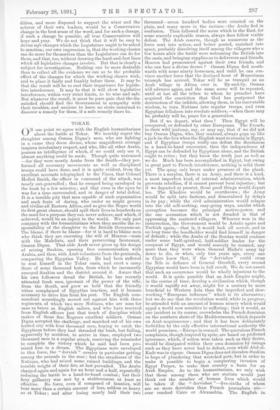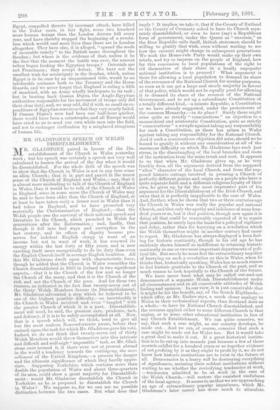TOKAR.
ON one point we agree with the English humanitarians about the battle at Tokar, We heartily regret the slaughter among Osman Digna,'s men, who are fighting in a cause they deem divine, whose magnificent courage inspires involuntary respect, and who, like all other Arabs, possess an intelligence of which, if we could only use it, almost anything could be made. Though quite untrained —for they were mostly Arabs from the South—they per- formed all necessary movements as well as disciplined troops could have done, and it is quite evident, from the excellent accounts telegraphed to the Times, that Colonel Holled Smith, the officer in command of the attack, was nearly out-generalled ; that he escaped being enveloped in the bush by a few minutes ; and that even in the open he was for a time surrounded, and in danger of total defeat. It is a terrible pity that men capable of such organisation and such feats of daring, who under us might govern and civilise all Eastern Africa, and so give the Negro world its first great chance, should spill their lives in hundreds on the sand for a purpose they can never achieve, and which, if achieved, would be an injury to the world. We only part company with the humanitarians when they ascribe the re- sponsibility of the slaughter to the British Government. The blame, if there be blame—for it is hard to blame men who think they are executing the will of Heaven—rests with the Mahdists, and their persevering lieutenant, Osman Digna. That able Arab never gives up his design of seizing Suakim, opening free communication with Arabia, and then, with Arab volunteers from the peninsula, conquering the Egyptian Valley. He had been suffered to seat himself in the Tokar oasis, and erect a camp there of some thousand huts, from which he incessantly annoyed Suakim and the district around it. Aware that his own followers dread the British, he has recently attracted fresh men, ignorant of the power of the rifle, from the South, and grow so bold that the friendly tribes complained of Egyptian inaction, and it became necessary to drive him from his post. The English com- mandant accordingly moved out against him with three regiments, of which two were Nubians, who are man for man as brave as English sailors, and who have received from English officers just that touch of discipline which makes of those fine Negroes excellent soldiers. Osman Digna accepted the challenge, and marched out of his own hutted city with four thousand men, hoping to catch the Egyptians before they had threaded the bush, but failing, apparently by accident, to arrive in time, employed two i thousand men n a regular attack, reserving the remainder to complete. the victory which he said had been pro- mised him in a dream.. The Egyptians were enveloped in this force, the " dervish " cavalry in particular getting among the animals in the rear ; but the steadiness of the Nubians, who had seized some ruined buildings, and the terrible weight of their fire, at last prevailed. The Arabs charged again and again for an hour and a half, repeatedly reducing the battle to a hand-to-hand combat ; but their fiery gallantry was met by a stubbornness at least as effective. No force, even if composed of fanatics, will bear more than a certain amount of loss, seldom so heavy as at Tokar ; and after losing nearly half their two thousand—seven hundred bodies were counted on the plain, and many more in the ravines—the Arabs fled in confusion. Then followed the scene which in the East, for some scarcely explicable reason, always does follow visible defeat. The Arab reserve, though as numerous as the force sent into action, and better posted, vanished into space, probably dissolving itself among the villagers who a few hours after the battle were welcoming the British into the oasis, and bringing supplies as to deliverers and friends. Heaven had pronounced against their own friends, and who can face a divine decree ? Osman Digna fled south- wards with some ninety horsemen, and until he can con- vince another force that the destined hour of Mussulman triumph has arrived, Tokar will be as tranquil as an Arab village in Africa ever is. By-and-by, Osman will advance again, and the same scene will be repeated, until at last all the tribes to whom he preaches have acquired the conviction that God has postponed the destruction of the infidels, allowing them, in his inscrutable wisdom, to turn Nubians into regular troops, and even Egyptian fellaheen into resolute soldiers,—when there may be, probably will be, peace for a generation.
But if we depart, what then ? Then Egypt will be conquered, or defended by other Europeans. The French, in their wild jealousy, say, or may say, that if we did not buy Osman Digna, who, they contend, always pops up like a jack-in-the-box when the English want to remain in Egypt, and if Egyptian troops really can defeat the Soudanese in a hand-to-hand encounter, then the independence of Egypt can be defended by Egyptians alone, and the British ought to retire ; but they know the truth just as well as we do. Much has been accomplished in Egypt, but owing in great part to French interference, nothing is solid there yet. The quag only bears under pressure of the plank. There is a surplus, there is an Army, and there is a kind, a most imperfect kind, of internal administration, which prevents rebellion, if it cannot prevent local injustice ; but if we departed at present, those good things would depart too. The Khedive would be overthrown ; the Army would be split into factions, and demoralised by delays in its pay ; while the civil administration would relapse into the old self-seeking, easy-going ways, amidst which corruption becomes the principal motive-power, an& the one accusation which is not dreaded is that of oppressing the scattered villagers. Whoever won in the insurrection, the Government would be Asiatic again and Turkish again,—that is, it would lack all morale, and in no long time the bondholder would find himself in danger of default ; while the Arabs of the Soudan would coalesce under some half-spiritual, half-soldier leader for the conquest of Egypt, and would scarcely be resisted, any more than they were when General Hicks's army lay down to die, or when, only two years ago, every one in Cairo knew that, if the " dervishes" could cross the Nile in defiance of General Grenfell, every second Egyptian would have been in full revolt. We do not assert that such an occurrence would be wholly injurious to the world. It is quite possible that an Arab Empire might, in the course of time, develop a civilisation which, though it would rapidly rot away, might for a century be more beneficial to Western Asia than the imperfect and slow- working "European influence" which is its alternative ; but we do say that the revolution would, while in progress', be attended with an amount of human misery which would appal a world now sensitive to suffering ; that it would, as one incident in its course, overwhelm the French dominion on the southern shore of the Mediterranean, which depends on Arab acquiescence ; and that it has been deliberately forbidden by the only effective international authority the world possesses,—Europe in council. The querulous French complaints, though inspired by spite, are based on profound ignorance, which, if action were taken such as they desire, would be dissipated within their own dominion by risings such as they have never had to defeat, even while Abd-el- Kadr was in vigour. Osman Digna does not threaten Suakim in hope of plundering that wretched port, but in order to make it possible to begin a conquering invasion of Egypt Proper, to make that country a basis for an Arab Empire. As to the humanitarians, we only wish that those among them who are statists would just think out the number of human lives which would be taken if the "dervishes "—five-sixths of whom are no more dervishes than French journalists are— over reached Cairo or Alexandria. The English in Egypt, compelled thereto by incessant attack, have killed in the Tokar oasis, in fair fight, some two hundred more human beings than the London drivers kill every year, and have thereby stopped the beginning of a revolu- tion which would cost more lives than there are in London altogether. They have also, it is alleged, "spread the seeds of incurable enmity" to the British name throughout the Soudan ; but where is the evidence of that, unless it be the fact that the moment the battle was over, the nearest tribes began feeding the Egyptian troops ? Orientals are not Frenchmen ; they accept defeat. We have not the smallest wish for sovereignty in the Soudan, which, unless Egypt is to be ours by an unquestioned title, would be an intolerable nuisance both to the Treasury and the Horse -Guards, and we never forget that England is ruling a fifth of mankind, with an Army wholly inadequate to its task ; but in beating back Osman Digna, the Anglo-Egyptian authorities responsible for the movement of troops only did their clear duty, and, we may add, did it with so small an ex- penditure of Egyptian resources that they very nearly failed. If Osman Digna's men had been one half-hour quicker, there would have been a catastrophe, and all Europe would have cried to us to send our own white men into the field, and not to endanger civilisation by a misplaced stinginess of human life.







































 Previous page
Previous page